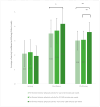Mental Health, Resilience, and Physical Activity in Civilians Affected by Conflict-Related Trauma: A Cross-Sectional Study
- PMID: 40805817
- PMCID: PMC12345707
- DOI: 10.3390/healthcare13151781
Mental Health, Resilience, and Physical Activity in Civilians Affected by Conflict-Related Trauma: A Cross-Sectional Study
Abstract
Background: Mass casualty events in conflict-affected regions can lead to the displacement of civilians and are often accompanied by substantial psychological and emotional impact on those affected. While physical activity is known to support mental health, the ways in which it relates to anxiety, resilience, and well-being in conflict-affected populations are still being explored. Objective: This study examined the associations among physical activity, anxiety, resilience, and well-being in evacuees from a conflict-affected zone. We hypothesized that higher levels of intense physical activity would be associated with higher levels of resilience and well-being and lower levels of anxiety. Methods: In this cross-sectional study, 107 evacuees completed an online survey in December 2023. The questionnaire assessed the frequency and intensity of physical activity, generalized anxiety, resilience, and well-being. Participants were categorized by weekly total physical activity levels. Data was analyzed using ANOVA, Pearson correlations, and multiple linear regression. Results: Evacuees engaging in more than three hours of vigorous-intensity physical activity exhibited significantly higher resilience and better well-being compared to those with lower activity levels. Although not statistically significant, the data suggested a possible pattern of lower anxiety among evacuees engaging in higher levels of physical activity. Regression analysis identified higher resilience and lower anxiety as significant predictors of greater mental well-being. Additionally, residing in a community exposed to a higher number of traumatic events was associated with reduced well-being. The overall model explained a substantial portion of the variance in mental well-being. Conclusions: Physical activity, especially intense exercise, is associated with improved mental health and resilience among evacuees, supporting its inclusion in interventions for trauma-affected populations.
Keywords: anxiety; conflict-related trauma; physical activity; resilience; well-being.
Conflict of interest statement
The authors declare no conflicts of interest.
Figures


References
-
- Shalev A.Y., Tuval-Mashiach R., Hadar H. Posttraumatic stress disorder as a result of mass trauma. J. Clin. Psychiatry. 2004;65((Suppl. 1)):4–10. - PubMed
LinkOut - more resources
Full Text Sources

